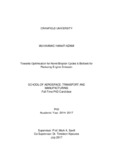JavaScript is disabled for your browser. Some features of this site may not work without it.
| dc.contributor.advisor | Savill, Mark A. | |
| dc.contributor.advisor | Kipouros, Timoleon | |
| dc.contributor.author | Azami, Muhammad Hanafi | |
| dc.date.accessioned | 2022-04-20T12:24:36Z | |
| dc.date.available | 2022-04-20T12:24:36Z | |
| dc.date.issued | 2017-07 | |
| dc.identifier.uri | http://dspace.lib.cranfield.ac.uk/handle/1826/17791 | |
| dc.description.abstract | Aviation industries potentially contribute to the vulnerable energy crisis and simultaneously pose environmental concerns. With the stringent policies and targeted plans, it has been found that drop-in biofuels could potentially offer solutions but that alternative combustor technologies may also be required to meet new 2050 target. The purpose of this research was thus to evaluate the feasibility of the biofuels in both conventional and pressure-rise gas turbine engine to obtain the best trade-off between performance and emission. The investigated contents encompass the evaluation of biofuels (spray analysis, engine performance analysis, and zero-dimensional detonation analysis) and emission analysis. Spray analysis modelled the atomization and spray penetration of the droplets and comparisons have been made at different injection conditions. It was found that biofuels have shorter penetration length and could potentially encourage soot formation. Subsequently, engine performance analysis utilizes an in-house software, PYTHIA, for modelling a three-shaft high-bypass-ratio engine, similar to RB211 variant at various off-design conditions using biofuels was studied. Results showed that Jatropha and Camelina biofuels potentially increase the engine performance. Further analysis is conducted utilizing Zel’dovich–von Neumann–Doering modelling of shock waves in detonative combustion. Results prominently exhibit high thermodynamic efficiency in isochoric heat addition. Focusing on NOx formation, an emission analysis was carried out for both combustors separately using an in-house HEPHAESTUS emission model prediction. Biofuels have shown NOx reductions for both combustors. Finally, the research brings together all the analyses and a trade-off assessment is conducted. Small reductions were found in the key objectives considered over the design space investigated. In the spray analysis, the contribution lies on the modelling of evaporation and penetration of third generation biofuel droplets. In gas engine performance, this research has contributed to a wider off-design engine flight cycles utilizing these third generations of biofuels. Moreover, detonative combustion in a simplified model by utilizing one-step chemistry over various initial conditions are also added the benefaction of this research. | en_UK |
| dc.language.iso | en | en_UK |
| dc.rights | © Cranfield University, 2017. All rights reserved. No part of this publication may be reproduced without the written permission of the copyright holder. | |
| dc.title | Towards optimisation for Novel Brayton cycles and biofuels for reducing engine emission. | en_UK |
| dc.title.alternative | PhD in Aerospace | en_UK |
| dc.type | Thesis | en_UK |
